Telecom remained on track to deliver a second-half operating profit of about $560 million, acting chief executive Chris Quin said yesterday.
During the three months ended March, there was an increase in competitive activity in the fixed line and mobile markets.
However, despite increased competition, Telecom remained focused on reducing costs and that allowed the company to deliver operating earnings profit guidance as planned.
"Competitors have been very active with a variety of new offers, which has increased customer churn. We are firmly focused on responding and improving customer retention."
As an example, Telecom had increased data caps on broadband plans, he said.
In the mobile market, Telecom was concentrating on growing its post-paid connections and it was seeing a continuing decline in its prepaid customer base before the expected shutdown of the CDMA network in July.
Management expected to deliver second-half reported earnings near the top of the $160 million to $190 million guidance range, Mr Quin said.
Net financing costs were lower than expected and that would help Telecom finish near the top of the range.
The fall in financing costs related to additional finance lease income following the demerger which would continue into the future.
Telecom also expected second-half capital expenditure to be near the top end of the $190 million to $220 million range.
Telecom had previously announced it intended delisting its American Depository Receipts (ADRs) from the New York Stock Exchange and chief financial officer Nick Olson noted its shares and ADRs would not be listed or quoted on another national securities exchange in the United States.
The last day of trading for Telecom's ADRs was expected to be July 9, with the delisting expected to become effective on July 19.
The delisting would reduce administration costs and complexity associated with the NYSE listing, he said.
ADRs made up 15% of Telecom's listed shares and the company would retain an ADR programme in the US on the over-the-counter (OTC) market to enable investors to trade their ADRs.
Trading on the OTC market was expected to start on July 10. The company's shares would remain listed and traded on the NZX and ASX.
"We are leaving no stone unturned in our drive to reduce costs and complexity and delisting from the NYSE is a logical step in this process.
"We remain committed to our US investor base and will retain high standards of corporate governance and continue to provide comprehensive and transparent financial reporting," Mr Olsen said.
Harbour Asset Management managing director Andrew Bascand said Telecom had provided returns to investors of 50% in the past year. About 10% of the return had been through dividends.
Telecom's current forecast dividend yield had fallen significantly as the price had lifted.
Consensus forecasts had a dividend of 16c or 17c for the next 12 months, he said.
"The market recognised value in the demerger between Telecom and Chorus, with the subsequent buy-back attracting global fund buying."
Telecom was now trading well above the consensus of analysts' discounted cash flow valuations and price targets.
According to UBS, Telecom was trading at a 30% premium to global telcos on a price to cash flow basis.
Several analysts had recently lowered their recommendations and Mr Bascand believed global buying from yield investors or those attracted to the buy-back might dissipate.
"Despite a significant focus on cost-out, it is hard to see Telecom growing profit in the next five years as the roll-out of the ultrafast broadband provides significant competition."
High yields alone might not sustain investor interest, he said.



